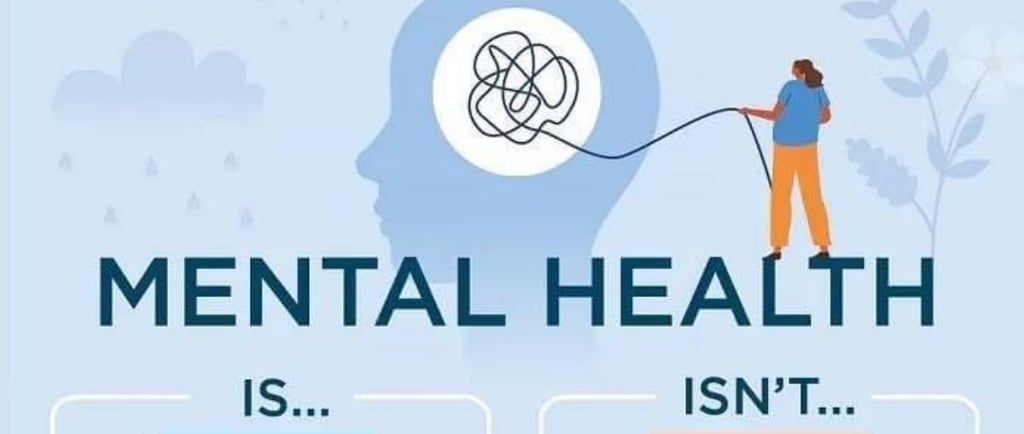What Mental Health Is and What It Isn’t
Mental health is an essential part of overall well-being, yet it is often misunderstood. Many people associate it solely with mental illness or assume that good mental health means feeling happy all the time. In reality, mental health is much broader it influences how we think, feel, and navigate life’s challenges.
All In Health
5/9/20253 min read


What Mental Health Is and What It Isn’t
Mental health is an essential part of overall well-being, yet it is often misunderstood. Many people associate it solely with mental illness or assume that good mental health means feeling happy all the time. In reality, mental health is much broader—it influences how we think, feel, and navigate life’s challenges. Understanding what mental health is and isn’tcan help reduce stigma and encourage a more balanced approach to emotional well-being.
What Mental Health Is
1. Mental Health Is a Spectrum
Mental health exists on a continuum, just like physical health. Some days we may feel strong and resilient, while other days we may struggle. Good mental health doesn’t mean never experiencing difficulties—it means having the ability to cope with them in a healthy way.
2. Mental Health Is More Than Just the Absence of Illness
Being mentally healthy doesn’t just mean avoiding conditions like anxiety or depression. It involves emotional regulation, stress management, self-awareness, and maintaining meaningful relationships. Just as being free of disease doesn’t automatically mean someone is in peak physical health, mental well-being requires ongoing care and attention.
3. Mental Health Is Affected by Many Factors
Our mental health is influenced by genetics, life experiences, relationships, stress levels, and even physical health. It’s not just a personal issue—it’s shaped by our environment, support systems, and social circumstances.
4. Mental Health Is Something We Can Strengthen
Just like physical fitness, mental health can be nurtured through self-care, therapy, mindfulness, and healthy coping strategies. It’s an ongoing process that requires effort, self-reflection, and, sometimes, professional support.
5. Mental Health Is Just as Important as Physical Health
Despite societal stigma, mental health is equally as vital as physical health. It affects energy levels, decision-making, relationships, and overall quality of life. Prioritizing mental health should be as common as exercising, eating well, or seeing a doctor for a physical checkup.


What Mental Health Isn’t
1. Mental Health Isn’t Just About Happiness
Many assume that good mental health means feeling happy all the time, but that’s unrealistic. Mental health includes the ability to experience and process a full range of emotions—including sadness, frustration, and grief—in a healthy way.
2. Mental Health Isn’t a Sign of Weakness
Struggling with mental health doesn’t mean someone is weak or lacks willpower. Mental health conditions can affect anyone, regardless of strength or character. Seeking help is a sign of courage, not failure.
3. Mental Health Isn’t Just for Those with Diagnosed Conditions
Everyone has mental health, just as everyone has physical health. Taking care of mental health isn’t just for those with conditions like depression or anxiety—it’s important for everyone, regardless of whether they have a diagnosis.
4. Mental Health Isn’t One-Size-Fits-All
There is no universal approach to mental well-being. Different people need different coping strategies, whether that’s therapy, medication, exercise, creative outlets, or social support. What works for one person may not work for another, and that’s okay.
5. Mental Health Isn’t Something to Ignore
Ignoring mental health struggles can make things worse over time. Just as we wouldn’t ignore a broken bone or persistent illness, mental health challenges should be addressed early. Seeking support—whether through therapy, talking to a friend, or practicing self-care—is essential for long-term well-being.


You Are Not Alone—Seek Help When You Need It
Taking care of your mental health is not a luxury—it’s a necessity. If you’re struggling, reaching out for help is one of the strongest and most important things you can do. Whether it’s talking to a trusted friend, joining a support group, or seeking professional guidance, support is available. You don’t have to navigate your journey alone. Prioritizing your mental well-being is an act of self-care and strength, and it’s never too early—or too late—to start.
Final Thoughts
Mental health is a lifelong journey, not a destination. It’s about finding balance, developing coping skills, and seeking support when needed. By understanding what mental health is and isn’t, we can break down stigma, encourage open conversations, and prioritize emotional well-being just as much as physical health.
GET STARTED TODAY
Your journey. Our commitment. Together, we’re all in.
STAY IN TOUCH
Contact Us
954-445-1567
© 2024. All rights reserved.
Contact Us
